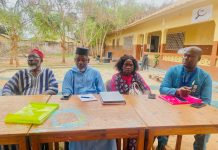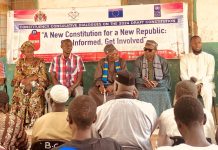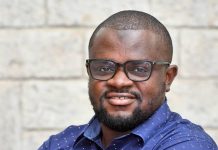I start today’s briefing by introducing three new additions to the Ministry. First, I would like to introduce Mr  Hussein Thomasi as the Special Adviser to the Attorney General. Mr Thomasi comes with over 25 years as counsel. He had served the Ministry since 1987 in various capacities including as State Counsel, Senior State Counsel, Principal State Counsel before he joined the Assets Management Recovery Corporation (AMRC) as a legal adviser in 1994. Mr Thomasi subsequently worked for WAMI in Accra, Ghana. As my Special Adviser, Mr Thomasi will act as the main Focal Point for all the reform activities of the Ministry including the transitional justice processes.
Hussein Thomasi as the Special Adviser to the Attorney General. Mr Thomasi comes with over 25 years as counsel. He had served the Ministry since 1987 in various capacities including as State Counsel, Senior State Counsel, Principal State Counsel before he joined the Assets Management Recovery Corporation (AMRC) as a legal adviser in 1994. Mr Thomasi subsequently worked for WAMI in Accra, Ghana. As my Special Adviser, Mr Thomasi will act as the main Focal Point for all the reform activities of the Ministry including the transitional justice processes.
The second person I would like to introduce is Mr Chernor Marenah as the new Solicitor General and Legal Secretary. Like Mr Thomasi, Mr Marenah comes with several years of experience as Counsel and a former staff member of the Ministry. He has also risen through the ranks at the Ministry since 2003 culminating in his promotion as Solicitor General and Legal Secretary in 2016.
As you can clearly see, both Mr Thomasi and Mr Marenah are not new to the Ministry. They are coming back to a familiar place. So from now on, if you have any questions about the work of the Ministry or the reform activities, Mr Thomasi and Mr Marenah will be available to answer them for you.
The third person I wanted to introduce to you today is Ms Katherine Muhren of the International Senior Lawyers Project (ISLP) but she is currently out of the country. Mr Muhren has been seconded to the Ministry by her organization at no financial cost to government following the execution of a Memorandum of Understanding between the Ministry of Justice and the ISLP. She comes with several years of legal practice experience including her current role as Vice Chairperson of the Board of Directors of the Institute of Human Rights and Development in Africa based here in The Gambia. She will be assisting the Ministry with complex international commercial agreements.
With these three new additions to the staff, I believe we have started the process of strengthening capacity at the Ministry. Their combined decades-long legal practice experience will provide leadership and mentorship for the young team of dedicated lawyers we now have at the Ministry. We will continue our efforts to attract highly qualified and competent personnel to the Ministry by improving the conditions of service among other measures in order to meet the growing demands of our work.
Regarding some of the main activities of the Ministry since my last press briefing in March, I am pleased to report that we have some progress with positive results:
ASSETS FREEZE
We have today obtained a court order freezing or placing a temporary hold on the known assets in the country of former President Yahya Jammeh and companies directly associated with him.
The freezing order affects:
- 131 landed properties held in the personal name of former President Yahya Jammeh or companies directly associated with him.
- 88 different bank accounts held in the personal name of former President Yahya Jammeh or held in the names of organizations directly associated with him;
- 14 companies purportedly belonging to or directly associated with former President Yahya Jammeh;
- A number of animals and livestock purportedly belonging to former President Yahya Jammeh.The application for the freezing order was necessitated by the discovery of unauthorized withdrawals of millions of dalasis and foreign currencies by former President Yahya Jammeh. For example, preliminary investigations have revealed that between 2006 and 2017, former President Yahya Jammeh personally or under his instructions directed the unlawful withdrawal of at least 189,000,000 from funds belonging to Social Security and Housing Finance Corporation. Between 2013 and 2017, former President Yahya Jammeh personally or under his instructions directed the unlawful withdrawal of at least $50,000,000 from Special Projects Fund and International Gateway Accounts at the Central Bank of The Gambia. Again, these are only preliminary findings at this stage and all indications are that these discoveries are just a tip of the iceberg.
The freezing order is therefore meant to prevent former President Yahya Jammeh from liquidating or dissipating assets held in his personal name or his assets held in the names of his close associates or agents so as not to cause prejudice to the State should there be adverse findings made against him by a court of competent jurisdiction which may require the recovery of assets and monies from him by the State.May I state however that this list of assets frozen is by no means exhaustive. Investigations are still ongoing and if we find other assets purportedly belonging to former President Yahya Jammeh or to companies or organizations directly associated with him in this country which are not already included in this freezing order, we shall also take immediate appropriate action. We therefore request anyone with information regarding the whereabouts of any assets of former President Yahya Jammeh or of companies or organizations directly associated with him to come forward and share this information with the nearest police station.
Any person who is in possession of assets purportedly belonging to former President Yahya Jammeh and who fails to disclose this may be committing an offence. We therefore urge you to approach the nearest police station within 48 hours after this press briefing to report this information.
As I also stated previously, we are finalizing the draft terms of reference for the establishment of a commission of inquiry to look into the financial and business related activities of former President Yahya Jammeh.TRUTH & REPARATIONS COMMISSION
We have successfully conducted a study tour of the transitional justice processes in Sierra Leone with special interest on their version of a truth and reconciliation commission. A report of the study tour with recommendations has now been submitted to me for review. The study tour team was led by me and was composed of Mr Hussein Thomasi, my Special Adviser; Ms Kanni Touray Senior State Counsel; Mr Bubacarr Sarr of The Gambia Police Force; Imam Baba Leigh as a representative of the victims; Ms Fatoumatta Camara as the designated communications strategist/outreach officer; and Mr Bashirou Jahumpa as the representative of the UNDP who sponsored the trip.
Following the completion of the study tour and after careful consideration based on several factors including recommendations made by the study tour team, we now wish to establish in The Gambia a Truth, Reconciliation and Reparations Commission whose principal objectives will be to give the victims of abuses a voice by allowing them to share their stories; give perpetrators the opportunity to tell the truth about these abuses in a manner that normal criminal proceedings will not permit; and to give appropriate compensation to the victims for loss or injury suffered as a result of the abuses. It is hoped that this process will lead to a healing on the part of victims and ultimately reconciliation across a broad spectrum of Gambian society who have been affected, either directly or indirectly by the events of the past 22 years. As a Government, we have a responsibility to actively forster social cohesion and encourage national reconciliation.We now have a draft bill for the establishment of The Gambia Truth, Reconciliation and Reparations Commission. The bill will be presented to the National Assembly as soon as it is finalized by the Ministry and approved by Cabinet. Thereafter, we hope to have the necessary support structures in place so that the Commission will start hearings by the end of the year. Appointment of commissioners and recruitment of support staff shall be guided by The Gambia Truth, Reconciliation and Reparations Commission Act after it is passed by the National Assembly.
However, it is crucial that we strongly encourage truth-telling about past abuses. We want to ensure documentation of an accurate historical record of past abuses so that appropriate lessons can be learned in order to put in place mechanisms to prevent recurrence. We must remind ourselves at all times that the people of this country wanted this change because they strongly disapproved of the manner of governance by the previous government. If we want to avoid going back to that kind of governance environment in future, we must conduct a post-mortem of the past starting from 22 July 1994 in order to understand how we got to this point in the first place. We would like to know how the infrastructure of terror was created during the past 22 years in this country, how it operated at various times, its membership, structure and other vital information.
That is why perpetrators must tell the whole truth. In order to encourage them do so, there will have to be some kind of benefit for them. This may take many forms including guarantees against future prosecution in appropriate cases. Similarly, perpetrators who do not come forward to share their experiences before the Commission would face prosecution should there be credible evidence of their involvement in any abuses. We will therefore strongly encourage anyone with information, especially those who were used as tools to perpetrate abuses against their fellow citizens, to come forward and share their stories with the Gambian people. That’s the least the perpetrators could do for the victims and their loved ones. They owe it to themselves and their own families too. It will provide some form of closure for the perpetrators themselves as well as the victims. We will therefore reach out to religious and community leaders, youth and women’s groups across the country through various means so that they can encourage members of their congregations and communities to tell the truth about past abuses as a pathway to our collective healing, peace and justice.
We also recognize that not everyone may be fully satisfied with the outcome of this process, but it is a process tried and tested in many parts of the world and is generally regarded as the best possible outcome for sustainable peace in an extremely challenging situation such as ours. But I assure everyone that ours will be a credible and transparent exercise.
Let me also make it clear, that there will be justice for everyone but justice can come in many different forms. It is not only about punitive sanctions against perpetrators. It also includes restoring, to the extent possible, the shattered lives of victims and their loved ones.The simple reality is that we may not be able to prosecute everyone who was involved in alleged State sanctioned crimes over the past 22 years since July 1994. There have been many unfortunate incidents during this period and too many people have been affected based on reports so far. Hard choices and difficult decisions will have to be made.
We have earned the respect and goodwill of the entire world by the sensible, peaceful and mature manner in which we have conducted ourselves as a people before and during the last elections. Nowadays, wherever we travel around the world and announce ourselves as Gambians, people we meet tell us how proud they are of us. We are a small nation with a big role to play in our sub-region and the world. We must understand that we have a unique historical opportunity to show the world that our conduct before, during and after the presidential elections in December and January, especially during the political crisis, is a true representation of our national character as a peace-loving and progressive people. We must therefore continue to demonstrate maturity in our actions as a nation and particularly in our quest for justice. This will bring immense benefits for our people here in the country and abroad. We can be an inspir
…





















